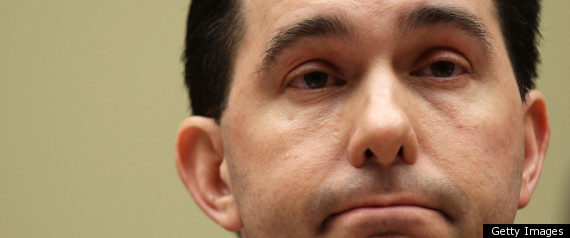 WASHINGTON -- As Wisconsin Democrats continued their push to force his recall, Gov. Scott Walker (R) came to Washington on Thursday to raise funds for the election that is all but certain to occur. But while Walker has slammed the influence of out-of-state money in the recall effort, he defended his own fundraising from non-Wisconsinites as fundamentally different from what he called the "excessive amounts" raised by unions and liberal groups.
WASHINGTON -- As Wisconsin Democrats continued their push to force his recall, Gov. Scott Walker (R) came to Washington on Thursday to raise funds for the election that is all but certain to occur. But while Walker has slammed the influence of out-of-state money in the recall effort, he defended his own fundraising from non-Wisconsinites as fundamentally different from what he called the "excessive amounts" raised by unions and liberal groups."The people from around the country who are helping us at the grassroots level are trying to match the amazing levels of money coming in from unions from Washington and throughout the country," said Walker at a question-and-answer event at the American Enterprise Institute on Thursday morning. Walker spoke at AEI before meeting with Republican donors at the Capitol Hill Club later in the day.
According to his latest campaign finance report, Walker has raised $5.1 million since the start of the recall effort on November 15th. Nearly half of that amount, $2.4 million, has come from outside of Wisconsin.
When asked by The Huffington Post about his fundraising, Walker acknowledged that the high amount of out-of-state donations was accurate but placed the blame on unions for his reliance on non-Wisconsin donors. "I wouldn't be raising a penny right now if it weren't for these recalls which were largely driven by the national unions," Walker said. He later added that "even money that's coming in from outside of Wisconsin in many cases is coming from people giving us 10, 15, 20 dollars, saying, 'We want to help you counter money coming from Washington and elsewhere.'"
Recall advocates must gather over 500,000 signatures by Jan. 17th to force a new election. The Wisconsin Republican Party is going to court to force the state to review many of the signatures collected; current law allows Wisconsinites to sign false names like "Mickey Mouse" as a long as they are properly dated, which Republicans say undermines the validity of the recall. Despite the lawsuit, however, the recall petition is almost certain to succeed, forcing an election over the summer.
Walker appeared unconcerned about a new campaign, citing the positions of candidates in the recall elections that occurred in the state last August. "None of the candidates who ran in the recall elections against state Senators ran on the platform of repealing collective bargaining," he noted. "They ran on anything but that issue. So I think that is clear to me that people like the reforms."
Ohio Gov. John Kasich (R) attempted to pass similar limits on public-sector unions in November, but the reforms were defeated in a referendum. The collective bargaining bill was never enacted because of a provision in Ohio law that blocked its implementation while the referendum was still ongoing.
In Wisconsin, however, Walker claimed that reforms have already returned many local government budgets to the black without impacting services. He repeatedly referred to two dates as moments when voters saw the positive effect of the laws: Sept. 1, the beginning of the school year, and the second week of December, when Wisconsinites received their tax bills. Walker claims that many school districts, including his own, added teachers and that a large number of Wisconsin citizens saw property taxes decrease. "Those two things alone, I think, are a tremendous counter to any attack ads they'll run against me," he said.
Walker believed that seeing the results of the law, an opportunity that Ohio voters didn't get, has led Wisconsinites to support it. He said he is confident running on the reforms, and will do so no matter who opposes him in the recall election. "Insert the candidate, it will be someone hand-picked by the unions," he said.
Original Article
Source: Huff
No comments:
Post a Comment